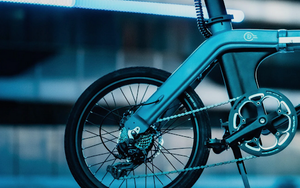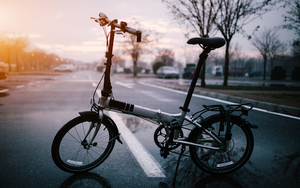Are Electric Scooters Legal in Nottingham?
May 27, 2024
Are Electric Scooters Legal in Nottingham?
Electric scooters have become increasingly popular as a convenient and eco-friendly mode of transportation. However, the legality of electric scooters, especially in urban areas like Nottingham, has been a topic of debate. In this article, we will delve into the electric scooter laws in the UK, understand the specific regulations in place for Nottingham, explore the arguments for and against legalisation, consider the impact of these laws on users, examine how other cities handle electric scooter regulations, and speculate on the future of electric scooters in Nottingham.
-
Understanding electric scooter laws in the UK
-
The debate around electric scooter legality
-
The impact of electric scooter laws on users
-
How other cities are handling electric scooter laws
-
The future of electric scooters in Nottingham
-
Conclusion
Understanding Electric Scooter Laws in the UK
Before diving into Nottingham's specific regulations, it's crucial to understand the basics of electric scooter legislation in the UK. Currently, electric scooters fall under the same legal category as motor vehicles, requiring them to be registered, taxed, insured, and operated by a licensed driver. However, there is no specific legal framework for electric scooters as they do not meet the requirements for registration and licensing.
Despite this legal ambiguity, the Department for Transport (DfT) has conducted trials in select cities to evaluate the feasibility of electric scooters as a sustainable transportation option. These trials are intended to inform potential legislation changes and ensure the safety of riders and pedestrians.
The Basics of Electric Scooter Legislation
Electric scooters, also known as e-scooters, are classified as Personal Light Electric Vehicles (PLEVs). PLEVs are subject to a maximum motor power output of 500 watts and a speed limit of 15.5 miles per hour (25 kilometres per hour).
Under the current legislation, electric scooters are only legal for private land use, with the owner's consent. Riding on public roads, pavements, and cycle paths is prohibited. Violating these restrictions may result in fines, penalty points on the rider's driving licence, and the scooter's confiscation. Last year, a total 1,111 e-scooters were confiscated across 20 police forces due to illegal usage.
Specific Laws Pertaining to Nottingham
In Nottingham, the legal status of electric scooters remains aligned with the general UK regulations. This means that e-scooters are not permitted on public roads, cycle paths, or pavements. Riders must adhere to these restrictions to avoid legal repercussions.
However, it's essential to highlight that the Nottingham City Council has plans to participate in the DfT-approved e-scooter trials. These trials aim to assess the suitability of electric scooters as an alternative mode of transport, providing valuable insights into their impact on travel patterns and the local community.

The Debate Around Electric Scooter Legality
The discussion surrounding the legality of electric scooters in Nottingham and other cities in the UK has gained notable attention. Advocates believe that legalising electric scooters could contribute to sustainable urban transport, reduce traffic congestion, and decrease air pollution. On the other hand, concerns and opposition exist regarding their impact on safety, pedestrian rights, and potential disruption of existing transport systems.
Arguments for Legalisation
Supporters argue that legalising electric scooters would offer numerous benefits to Nottingham and its residents. Firstly, electric scooters provide an environmentally friendly alternative to cars, reducing carbon emissions and improving air quality. Additionally, they can alleviate traffic congestion and overcrowding on public transport by offering a convenient alternative for short trips.
Moreover, legalising electric scooters could positively impact the local economy by promoting tourism and attracting businesses that specialise in scooter rentals and maintenance. This could create job opportunities and contribute to the growth of sustainable transport sectors.
Concerns and Opposition
Opponents express several concerns regarding the legalisation of electric scooters. One major concern is safety. Electric scooters, when travelling at higher speeds, can pose a risk to both riders and pedestrians. There are worries that inexperienced riders may cause accidents, especially in crowded areas and on busy roads.
Furthermore, opponents argue that allowing electric scooters to share cycle paths with bicycles might lead to conflicts and endanger vulnerable road users. Additionally, the potential proliferation of e-scooters could result in indiscriminate parking, obstructing pavements and causing hazards for pedestrians, particularly those with mobility challenges.

The Impact of Electric Scooter Laws on Users
The introduction of electric scooter laws in Nottingham has significant implications for different user groups, including commuters, tourists, and visitors to the city.
Implications for Commuters
Commuters often face challenges with the "last-mile" connectivity, referring to the distance between public transport hubs and their final destination. Electric scooters can bridge this gap, offering a convenient and efficient way to travel short distances. However, the current regulations restrict their use on public roads and cycle paths, limiting their potential as a viable commuting option.
If Nottingham were to legalise electric scooters, commuters could benefit from reduced journey times, increased flexibility, and improved accessibility to different parts of the city. This could lead to a shift towards more sustainable transport choices and contribute to easing traffic congestion. The Kugoo G2 Pro Electric Scooter makes a great commuter road electric scooter.
Consequences for Tourists and Visitors
Nottingham, known for its rich history and vibrant tourism industry, could leverage electric scooters to enhance the visitor experience. Legalising e-scooters could provide tourists with an exciting and convenient means to explore the city's attractions and move between popular destinations.
Additionally, electric scooter rental services could emerge, offering tourists an eco-friendly transportation option while generating revenue for the local economy. By embracing this emerging trend, Nottingham has the potential to position itself as a forward-thinking city committed to sustainable urban transport.
How Other Cities are Handling Electric Scooter Laws
To gain insights into the potential impact of electric scooter legalisation, it is helpful to examine how other UK cities and international counterparts are handling similar legislation.
Comparing Regulations Across the UK
Several UK cities have participated in e-scooter trials, including Birmingham, Liverpool, and Bristol. These trials have provided valuable data on ridership patterns, safety considerations, and the integration of electric scooters into existing transport networks. The experiences and lessons learned from these trials may inform future legislation changes in Nottingham and other cities.
Lessons from International Cities
Internationally, cities like Paris, Madrid, and Berlin have implemented electric scooter-sharing schemes, with varying degrees of success. These cities have established dedicated parking zones, enforced safety guidelines, and regulated scooter speeds to ensure safe and responsible usage. Learning from these examples could help Nottingham develop effective strategies for managing electric scooters if they were to become legal in the future.

The Future of Electric Scooters in Nottingham
Looking ahead, the future of electric scooters in Nottingham remains uncertain. However, several factors may influence their prevalence and legality in the city.
Potential Changes in Legislation
The ongoing e-scooter trials in Nottingham and other cities across the UK will provide valuable data and insights into the feasibility of legalising electric scooters. If the trials demonstrate positive outcomes in terms of safety, ridership, and environmental impact, there is a possibility that legislation may evolve to accommodate these vehicles.
Moreover, public opinion and demand for electric scooters may influence policymakers to consider amending existing regulations or developing new frameworks specifically tailored to these innovative modes of transport.
The Role of Electric Scooters in Sustainable Urban Transport
Electric scooters have the potential to play a significant role in Nottingham's vision for sustainable urban transport. By offering a convenient, eco-friendly, and efficient mode of transportation, they could contribute to reducing greenhouse gas emissions, improving air quality, and addressing the city's congestion challenges.
However, achieving a balance between the benefits of electric scooters and ensuring safety, accessibility, and harmonious coexistence with other road users will be crucial. Continued monitoring and evaluation of the impact of electric scooters on Nottingham's transportation system will guide the city's decision-making process.
Conclusion
In conclusion, the legality of electric scooters in Nottingham is currently aligned with general UK regulations, prohibiting their use on public roads, cycle paths, and pavements. However, ongoing e-scooter trials in the city may lead to potential changes in legislation. The impact of legalising electric scooters could have far-reaching consequences for commuters, tourists, and the overall sustainability of Nottingham's transport system. By learning from other cities' experiences and considering the unique needs of Nottingham, policymakers can shape future regulations that balance the benefits and risks associated with electric scooters.






